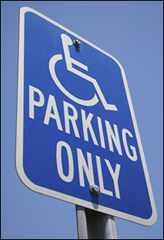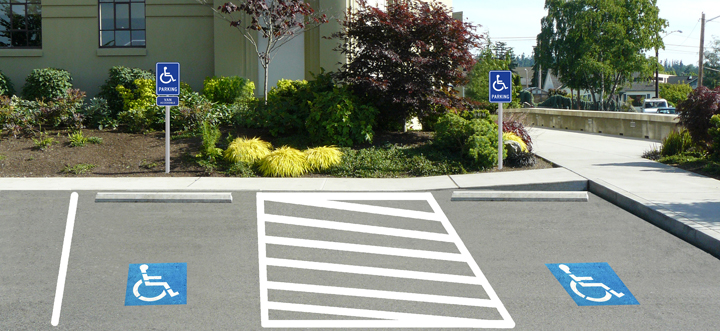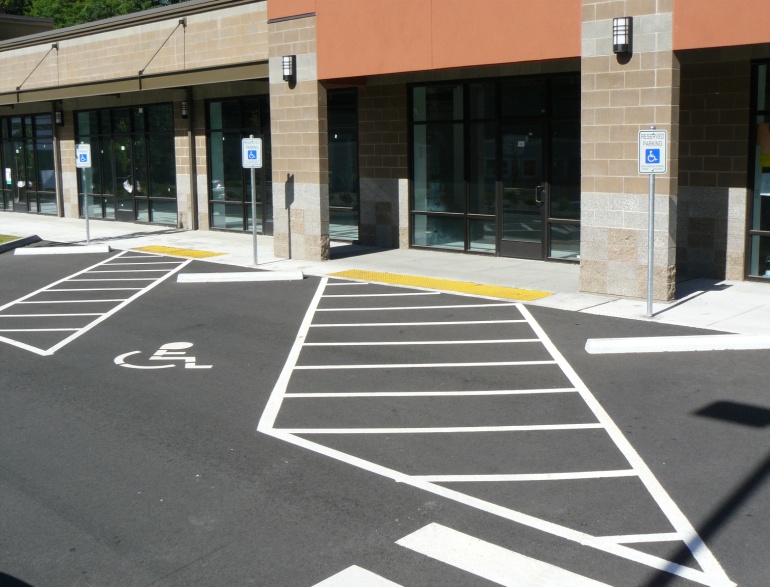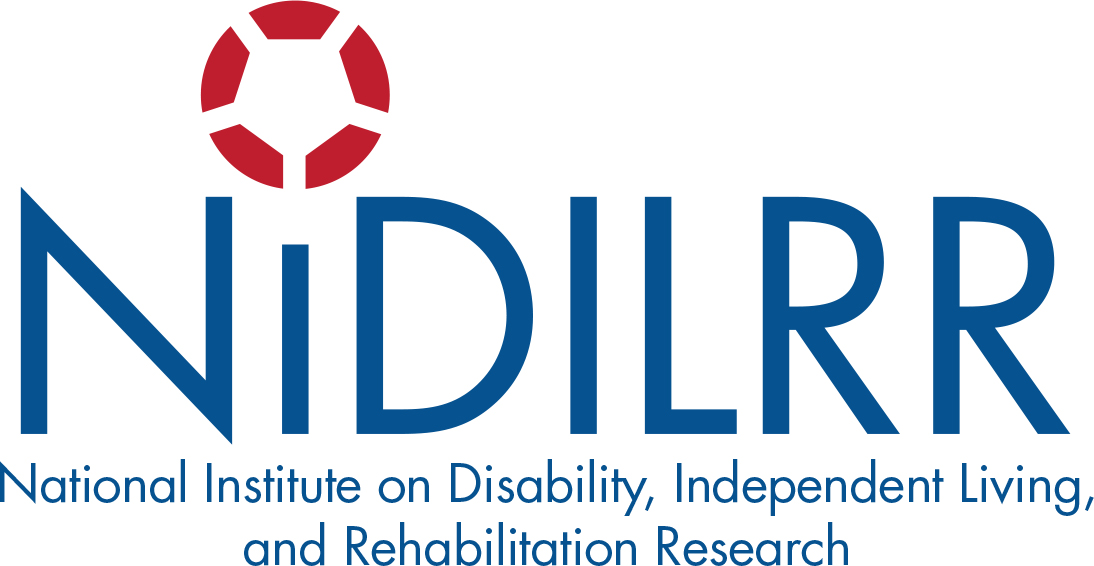Print-Friendly PDF | Large-Print PDF
 Businesses that employ more than 15 individuals are covered by the Americans with Disabilities Act (ADA). The ADA’s regulations have specific requirements regarding the provision of parking that vary depending on whether the employer is in control of the parking lot, whether parking is offered as a benefit of employment, and whether a parking space (accessible or designated) constitutes a reasonable accommodation for an employee with a disability. This document does not directly address the technical requirements under the ADA’s accessibility guidelines. Instead, it explains, via scenarios, the legal obligations of businesses with regard to parking policies and practices under the ADA. For technical assistance, please review the list on the last page of this document.
Businesses that employ more than 15 individuals are covered by the Americans with Disabilities Act (ADA). The ADA’s regulations have specific requirements regarding the provision of parking that vary depending on whether the employer is in control of the parking lot, whether parking is offered as a benefit of employment, and whether a parking space (accessible or designated) constitutes a reasonable accommodation for an employee with a disability. This document does not directly address the technical requirements under the ADA’s accessibility guidelines. Instead, it explains, via scenarios, the legal obligations of businesses with regard to parking policies and practices under the ADA. For technical assistance, please review the list on the last page of this document.
My business owns the parking lot adjacent to our building and the lot is open to both customers and employees. Parking is available on a first-come, first-served basis.
Businesses offering parking are required by the Americans with Disabilities Act to ensure availability of a certain number of accessible parking spaces.
| Total Spaces In lot | Min. # Accessible Spaces |
| Standard | Van | Total | |
| 1 through 25 | 0 | 1 | 1 |
| 26 through 50 | 1 | 1 | 2 |
| 51 through 75 | 2 | 1 | 3 |
| 76 through 100 | 3 | 1 | 4 |
| 101 through 150 | 4 | 1 | 5 |
| 151 through 200 | 5 | 1 | 6 |
| 201 through 300 | 5 | 2 | 7 |

An accessible parking space is a space with an access aisle that adjoins an accessible route. An accessible route is defined as a continuous, unobstructed way of pedestrian passage by means of which an area can be approached, entered, and exited, and which connects the area with an exterior approach such as a sidewalk, street, or parking area. What area must be made accessible via an accessible path of travel is broadly defined as an area’s “primary function”; for example, if it is a conference facility, then access to the conference rooms must be provided via an accessible route. Restrooms, drinking fountains, and telephones must also be included in an accessible route.
My business owns the parking lot adjacent to our building, the lot is open to both customers and employees, and employees get a designated space. Employee spaces are assigned on a first-come, first served basis.
In addition to the numerical space requirements under the ADA (see links above), employers are required to provide reasonable accommodations to employees with disabilities. Parking may be a reasonable accommodation for an employee with a mobility disability, in the form of either a designated space (for instance, one closer to the place of work), or, an accessible space as described above. Therefore, a “first-come, first-served” policy may need to be modified in order to accommodate the parking needs of employees with disabilities.
My business owns the parking lot adjacent to our building, and we offer special parking to our executive management which is located closer to the entrance to the building. We otherwise do not offer parking to our employees.
Here there is a generally applicable policy of providing preferential treatment to executive employees with regard to parking. Does the employer in this instance need to modify this policy in order to accommodate employees with disabilities? The answer is generally no—since parking is not offered as a general benefit of employment, this executive-level benefit need not be extended to employees with disabilities who do not otherwise qualify for executive-level parking, unless it would be a reasonable accommodation under the circumstances to trump this policy in order to meet the needs of an employee with a disability.
If parking was provided to all employees, with preferential parking to executive staff, then the employer would also have to consider modifying its policies in order to accommodate the needs of an employee who may need to be located closer to the building due to a disability.
 My business does not own the parking lot that is used by our customers and employees.
My business does not own the parking lot that is used by our customers and employees.
Entities that do not provide parking at all are generally exempt from the requirement that a minimum number of accessible spaces be provided leading to an accessible route. However, businesses that contract with third parties to provide parking to their customers or employees, and the third-party operators of parking facilities generally are responsible to provide accessible parking under the ADA according to the standards cited in the first scenario.
As a practical matter, where the employer has contracted for parking with a third-party operator, the parties at the outset should address how they will accommodate the parking needs of users with disabilities (whether employees or customers—depending on for whom the employer/business is providing the parking). As new needs are identified (a new employee is hired who requires accessible parking and parking is generally provided as a benefit of employment, for example) the employer and third-party operator must take equal responsibility to ensure the parking benefit, and the parking facility, are accessible to that new employee.
As a matter of providing access to its services as a covered entity itself, the third-party parking operator may have to offer accessible or designated spaces in lieu of offering its usual valet parking services, (an explanation for this is provided in the analysis accompanying the 2010 Accessibility Standards: valet parking staff may lack the skills to drive a specially equipped vehicle). Mechanized parking lots (where a ticket is given at an automated kiosk upon entry) are also not exempt from providing accessible parking options under the 2010 Standards. And now, parking lots that provide multiple points of access into an adjacent facility must ensure that all those access points are accessible under the 2010 Standards, where the 1991 standards (in effect until March 15, 2012) only required that one such access point be accessible.
If parking is not provided as a benefit of employment, parking may still be a reasonable accommodation if an employee is otherwise unable to access the work site and providing the parking (or other accommodation) would not impose an undue burden on the employer. Employers should consider providing accessible or designated parking, changing the location of the worksite, or allowing the employee to work from home as possible accommodations.
The employer has ultimate say with regard to what accommodation to offer as long as the accommodation is effective; and there may be alternatives to accessible or designated parking that will as effectively enable an employee with a disability to work. The courts and the EEOC have not taken a clear position on whether employers who do not offer parking generally, or who offer parking benefits to customers or management that are not extended to employees generally, may still be obligated to offer parking to employees with disabilities as a reasonable accommodation, so employers are advised to consider whether offering parking would be a reasonable accommodation and what other accommodations might be effective, rather than dismissing the issue outright.
Note that the possession of a state-issued disabled parking placard does not automatically confer a right to parking for an employee where the employer does not provide parking as a benefit of employment, unless parking can be negotiated as a reasonable accommodation. In the latter situation, the employee may only be entitled to a designated space, and not necessarily an accessible space, depending on the reason parking is required as a reasonable accommodation. For example, an employee with a disability who does not use a wheelchair may not require an accessible parking space but may instead require designated parking in close proximity to the work site.
For technical assistance:
- Northwest ADA Center, 1-800-949-4232, nwadactr@uw.edu
- US Department of Justice ADA Information Line 800-514-0301
- ADA Standards for Accessible Design available on the ADA.gov website
- Accommodation and Compliance: Parking available on the Job Accommodation Network website at askjan.org
 The Northwest ADA Center is a member of the ADA National Network. This fact sheet was developed under grant from the Administration for Community Living (ACL), NIDILRR grant #90DPAD0002. However, the contents do not necessarily represent the policy of the ACL, and you should not assume endorsement by the federal government.
The Northwest ADA Center is a member of the ADA National Network. This fact sheet was developed under grant from the Administration for Community Living (ACL), NIDILRR grant #90DPAD0002. However, the contents do not necessarily represent the policy of the ACL, and you should not assume endorsement by the federal government.
